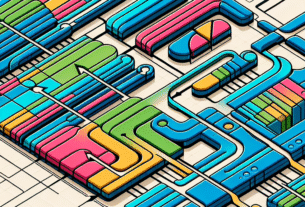Table of Contents
In a world filled with constant distractions, mastering the art of deep work is crucial for achieving focused success.
Deep work involves dedicating your attention to a cognitively demanding task without interruptions. This significantly boosts productivity and enables the swift acquisition of complex skills.
Understanding and implementing deep work techniques can transform the way you engage with professional and personal challenges, leading to remarkable results.

Engaging in deep work requires cultivating habits and strategies that minimize distractions, allowing you to harness your concentration fully.
By integrating these techniques into your routine, you create an environment that supports sustained focus and increases your potential for success.
The deep work mastery provides a competitive advantage in today’s economy, setting you apart as someone capable of unparalleled focus and productivity.
The benefits of deep work extend beyond individual projects, influencing your overall employability and long-term career development. As you refine your deep work skills, you’ll discover not only a stronger work ethic but also an improved ability to navigate complex tasks effectively and efficiently.
Key Takeaways
- Deep work boosts productivity and skill acquisition.
- Minimizing distractions enhances concentration and success.
- Deep work mastery improves employability and focus.
The Foundations of Deep Work

Deep work focuses your attention on high-quality tasks by eliminating distractions, while shallow work often lacks depth and impact. Mastery of deep work involves understanding these processes and their impact on productivity.
Understanding Deep Work and Its Significance
Deep work involves engaging in professional activities that require full concentration and push your cognitive abilities to their limits. It enables you to absorb complex information and produce high-quality work efficiently.
The deep work hypothesis suggests that cultivating intense focus is essential for success in today’s knowledge economy. By harnessing this practice, you can refine your skills, boost creativity, and enhance cognitive performance.
Craftsmanship ties into deep work, as it embodies a commitment to excellence and skill development. By valuing attention and discipline, you can achieve more in less time and with greater rewards. This approach minimizes trivial tasks and emphasizes meaningful accomplishments that drive personal and professional growth.
Contrasting Deep and Shallow Work
Shallow work encompasses tasks that are generally non-cognitively demanding, often performed while distracted. These activities may feel productive but contribute minimally to meaningful progress. Examples include responding to emails or attending unproductive meetings.
Understanding the differences between deep and shallow work is crucial for maximizing productivity. Allocating more time to deep work fosters an environment for high-quality contributions.
By identifying and curbing shallow activities, you can focus on tasks that truly matter. Over time, this transformation helps you maintain a balanced workflow and achieve sustained success. You gain more control over your schedule, allowing for dedicated blocks of time to immerse yourself in concentrated efforts.
Philosophies of Deep Work

Deep work philosophies offer frameworks to integrate focused productivity into your daily life. They guide you on how to manage your time and attention to excel in demanding tasks. Understanding these approaches helps you choose the best strategy to enhance your concentration and overall productivity.
Rhythmic Philosophy for Sustained Focus
The rhythmic philosophy emphasizes the establishment of a regular pattern for deep work sessions. You create a habitual routine that earmarks specific times for focused work, similar to a rhythm that beats steadily throughout your day.
This consistency minimizes decision fatigue, enabling you to enter a state of deep concentration with ease.
By setting aside dedicated blocks of time, your brain becomes accustomed to expecting and preparing for deep work. This approach can blend seamlessly with your life, reinforcing discipline without being overbearing. Cal Newport, the proponent of deep work, advocates for making these work periods as routine as possible, akin to a daily habit.
Bimodal Philosophy: Balancing Depth and Breadth
The bimodal philosophy involves allocating significant periods of time exclusively for deep work, while balancing other periods for more varied tasks. This method advocates for the separation of focus-intensive periods from more flexible ones.
You might dedicate a week or more to uninterrupted deep work, followed by a period of interaction and casual tasks. This approach embraces both total immersion and a more relaxed engagement with work, allowing you to retain the benefits of both worlds.
It’s particularly useful for individuals who need to manage complex projects alongside ongoing responsibilities. Bimodal philosophy acknowledges the need for balance between intensive focus and the breadth of daily tasks.
Monastic Philosophy: Intense Single-Mindedness
The monastic philosophy involves a strong commitment to eliminating all forms of distraction and immersing yourself fully into deep work. Inspired by monastic living, this approach is characterized by extreme focus and the removal of all non-essentials.
It demands a lifestyle shift that prioritizes deep work above nearly all other commitments. For those who adopt this method, interactions and interruptions are minimized to achieve unparalleled levels of concentration.
The primary goal here is to deeply engage with the work at hand, often leading to remarkable breakthroughs. This philosophy requires a rigorous environment conducive to maintaining a single-minded focus.
Journalistic Philosophy: Opportunistic Concentration
Journalistic philosophy focuses on seizing any available moment for deep work, similar to how journalists might work under varied and unpredictable circumstances.
Adaptability is key here, as it involves fitting deep work into gaps in your schedule as they arise. This requires discipline and the ability to transition swiftly into a state of focused productivity.
You seize opportunities for deep work whenever they present themselves, regardless of schedule constraints. This philosophy is beneficial for individuals whose work demands are unpredictable. It emphasizes agility and readiness, allowing you to capitalize on variable periods of concentration amid a hectic agenda.
Cultivating a Deep Work Ethic

To develop a strong deep work ethic, consider adopting practices that enhance focus and optimize your mental resources. Embrace boredom to foster your concentration, engage in deliberate practice for skill mastery, and recharge your cognitive energy with strategic downtime.
Embracing Boredom and Building Concentration
Boredom can enhance your ability to concentrate. By not giving in to every distraction, you train your mind to tolerate and even utilize periods of inactivity. This helps sharpen your focus when engaging in complex tasks.
Practice regular periods of disconnection from digital devices to boost concentration stamina. Integrate these moments into your routine gradually, allowing your mental energy to recalibrate and build over time.
Mastering Difficult Tasks Through Deliberate Practice
Deliberate practice is essential for mastering complex skills and information. Identify the skills you want to improve and break them down into components.
Focus on challenging aspects that require most effort. Repeat these deliberately while seeking feedback. This method accelerates learning and deepens understanding.
Dedicate consistent time blocks for practice, ensuring you work just beyond your current capabilities to foster optimal skill enhancement.
Leveraging Downtime for Cognitive Recharging
Effective downtime is crucial for restoring mental energy. Use breaks intentionally to recharge rather than aimlessly slipping into more distractions.
Physical activities such as walking, or relaxation techniques like meditation, can replenish cognitive resources.
Schedule regular breaks in your work sessions and use this time for activities that detach you from work stress. Such practices help maintain focus and productivity throughout your day.
Strategies for Minimizing Distractions

To excel at deep work, minimizing distractions is essential. This involves creating environments and habits that reduce interruptions from digital platforms, environment factors, and psychological tendencies.
Creating a Distraction-Free Environment
Establishing a workspace free from unnecessary disruptions is crucial. Begin by identifying and removing environmental factors that divert attention. Organize your space to make everything you need accessible, minimizing the need to interrupt your flow to find items.
Reduce noise and adjust lighting to suit your preferences, as these can impact concentration. Consider using noise-canceling headphones or playing ambient sounds to artificially create a soothing environment.
Also, establish boundaries with others. Communicate your need for uninterrupted time, and use visual cues like a closed door or sign to indicate when you shouldn’t be disturbed.
Mitigating the Impact of Digital Distractions
Digital distractions, particularly from social media and messaging apps, are persistent obstacles. Disable notifications on devices to prevent constant alerts.
Use apps like Freedom or Cold Turkey to block distracting websites during focus periods.
Schedule specific times for checking emails and social media, rather than allowing them to intrude anytime. Use features like Do Not Disturb to mute notifications during these blocks.
Consider using the Pomodoro Technique to maintain sustained focus for short bursts, followed by breaks. This not only improves concentration but also helps manage digital temptations.
Handling the Psychological Aspects of Distraction
Distractions often stem from psychological factors like stress or anxiety. Developing habits to manage these can enhance focus.
Start by practicing mindfulness meditation, which promotes awareness and helps in recognizing when your attention is wavering.
Set clear, achievable goals to maintain motivation and reduce the urge to distract oneself. Break larger tasks into smaller steps to feel more in control and less daunted.
Regular breaks, physical activity, and adequate rest are also vital. They help maintain mental clarity and manage stress better.
Consider keeping a journal to reflect on what distractions frequently occur and strategize on how to tackle them in the future.
Creating an Optimal Deep Work Routine

Embrace the deep work philosophy by constructing a routine that prioritizes focused sessions free from interruptions. Key components like structured schedules and balanced breaks are essential to maintain productivity and avoid burnout.
Designing Effective Work Schedules
Begin with the rhythmic philosophy—a highly effective approach for scheduling deep work consistently. This involves setting regular, non-negotiable blocks of time each day dedicated solely to deep work.
By creating a predictable schedule, you minimize attention residue, the lingering thoughts from previous tasks that can disrupt focus.
Consider implementing think weeks where you allocate entire days or weeks for immersion in significant projects.
During these periods, remove all non-essential tasks to concentrate on complex work. Use tools such as calendars to allocate specific times each day for uninterrupted work, ensuring alignment with your natural energy peaks.
Incorporating Rest and Leisure for Balance
Balancing intense work periods with routine breaks is crucial for maintaining sustained focus and creativity.
Strategic rest periods allow your brain to recharge and process information effectively. Schedule short breaks within your deep work sessions to prevent mental fatigue and enhance concentration.
Incorporate leisure activities that help detach you mentally from work-related thoughts. Activities like walking, reading, or even meditation can help reset your mind, ensuring you return to work sessions refreshed.
This balance between intense focus and relaxation supports deeper cognitive function and increases overall productivity by maintaining your mental health.
Employability and the Deep Work Advantage
Mastering the art of deep work can significantly enhance your employability. By sharpening your focus and cognitive capabilities, you increase your ability to perform complex professional activities efficiently.
Harnessing Deep Work for Professional Growth
By consistently practicing deep work, you can improve your cognitive capabilities, allowing you to handle demanding professional tasks with ease.
Developing this skill enables you to learn complex concepts faster, making you a valuable asset to employers.
Incorporating deep work into your routine can also lead to increased creativity and innovation. Companies value talent that can solve problems and generate new ideas. When you focus intensely without distractions, your ability to produce unique insights and solutions grows.
The Role of Concentration in Maintaining Employability
Your ability to concentrate deeply plays a crucial role in staying employable in a competitive job market. Deep work enhances your capacity to engage in professional activities that require prolonged concentration.
This skill helps you deliver quality results consistently.
Employers seek individuals who can maintain focus in high-pressure environments. By fostering concentration through deep work, you can meet the demands of modern workplaces.
This skill also bolsters your resilience, helping you manage stress and adapt to changes effectively.
Beyond Individual Mastery
Incorporating deep work goes beyond personal benefits. Organizations and industries must adapt to thrive in a world dominated by intelligent machines.
By examining the practices of industry leaders, you can find inspiration for fostering a deep work ethic that drives success.
Deep Work in an Age of Intelligent Machines
Intelligent machines are transforming the landscape of knowledge work, demanding a renewed focus on deep work strategies. Implementing deep work can help you maintain competitive advantages.
Machines excel at repetitive and predictable tasks, making deep work vital for tasks requiring creativity and critical thinking.
You need to cultivate skills beyond mere technical knowledge. Emphasizing deep work means developing your ability to engage with complex problems.
This ensures you remain invaluable in an evolving work environment.
Cultivating a Culture of Depth in Organizations
Creating an organizational culture that values deep work requires deliberate strategies. Encouraging deep work involves setting designated distraction-free time periods.
Promote environments where employees can focus without interruptions, increasing productivity and innovation.
Leadership must communicate the importance of depth in the workplace. Developing policies that support focused efforts is key.
These may include meeting-free days or offering quiet zones.
Recognition of deep work’s value fosters a culture that encourages individual and team contributions to collective success.
Noteworthy Individuals and the Deep Work Ethic
Notable figures have emphasized deep work as a cornerstone of their achievements. Cal Newport, author of Deep Work, highlights how focused concentration can elevate career success.
Bill Gates famously took “Think Weeks,” periods of dense focus, to advance his strategic thinking and problem-solving.
Even historical figures like Carl Jung practiced seclusion to delve deeply into their work. By emulating these individuals, you can prioritize depth in your activities.
Learning from these examples reinforces the deep work philosophy. Adopting similar strategies enables you to improve your cognitive capabilities in significant ways.
Frequently Asked Questions
Deep work, a method of focusing intently on complex tasks, offers ways to boost productivity by eliminating distractions and enhancing concentration. Applying these techniques across various situations and professions can significantly transform how you approach your work.
What are the core principles of deep work and how can one apply them?
Deep work emphasizes minimal distractions and intense focus on cognitively demanding tasks. You can apply these principles by setting aside dedicated time for uninterrupted work, eliminating digital distractions, and creating a distraction-free environment.
How can I improve my concentration while working in a noisy environment?
To enhance concentration in a noisy setting, consider using noise-canceling headphones or soft background music.
You might also choose a quieter location or establish specific work hours when you’re less likely to be disturbed.
What strategies are recommended in the book for minimizing distractions?
The book recommends scheduling deep work blocks, logging out of non-essential communication tools, and prioritizing key tasks.
It suggests that identifying and removing sources of interruption is crucial in maintaining productive focus.
How does deep work contrast with shallow work, and why is it more valuable?
Deep work involves activities requiring significant cognitive effort and concentration, resulting in high-value output. In contrast, shallow work consists of logistical tasks easily replicated by others.
Deep work is more valuable as it leads to skill development and original thought.
Can deep work techniques be applied to any profession, and if so, how?
Yes, deep work techniques can be applied across professions. Tailor the approach to your field by identifying high-impact tasks, blocking time for focused work, and reducing interruptions pertinent to your work environment.
What is the recommended approach for transitioning to a deep work routine?
Start by analyzing your current work habits and pinpointing distractions.
Gradually build deep work sessions into your schedule, increasing their length and frequency as you adapt.
Develop rituals to signal the start of your deep work period, helping to create a consistent routine.
Want to conquer distractions and boost your concentration?
These resources can help:
- “Deep Work: Rules for Focused Success in a Distracted World” by Cal Newport: This is the foundational book on the topic, explaining the concept, its benefits, and practical strategies. (Essential reading for this article’s topic)
- “Digital Minimalism: Choosing a Focused Life in a Noisy World” by Cal Newport: A companion to “Deep Work,” focusing on how to intentionally reduce digital clutter to enhance focus.
- “Indistractable: How to Control Your Attention and Choose Your Life” by Nir Eyal: Offers practical models and tactics for managing internal and external triggers of distraction.
- “Flow: The Psychology of Optimal Experience” by Mihaly Csikszentmihalyi: Explores the state of “flow” where one is fully immersed and energized, which deep work aims to achieve.
- “Atomic Habits: An Easy & Proven Way to Build Good Habits & Break Bad Ones” by James Clear: Helps in building the small, consistent habits necessary for deep work.
- “The 7 Habits of Highly Effective People” by Stephen Covey: Especially Habit 3, “Put First Things First,” which aligns with prioritizing deep work.




